Low headline prices are a great way to attract attention in the web hosting market, and Lithuania-based Hostinger understands this better than most: plans from $0.99 a month? Really?
As you'd expect, there are catches: there's support for only one email address, one database and two subdomains, you're limited to 100GB bandwidth, and you only get the $0.99 deal if you sign up for four years (after that, it renews at $2.15.)
But there's good news, too. Easy WordPress installation; a free SSL certificate; LiteSpeed to boost performance. If you're nervous about the lengthy contract, do the math. Hostinger asks just $47.52 for the first four years, less than a mid-range VPS might cost you for a month elsewhere. Even if you only use it for a couple of years, you'll have got decent value for money.
- Want to try Hostinger? Check out the website here
If you've bigger ambitions, moving up the shared hosting range should help. The best value Business plan supports unlimited email accounts, bandwidth and websites, adds daily backups and gets you 4x the resources. It's priced at a low $3.99 a month over the first four years, $7.95 on renewal. The lengthy contract is more of an issue as prices rise, but this still looks like a good deal to us, competing well for value with even top names like HostGator.
All the plans are covered by a 30-day money-back guarantee. This has the usual restrictions you'll find with hosting – you won't get a refund for domain name registrations, for instance – but we didn't notice any other sneaky clauses which might catch you out.
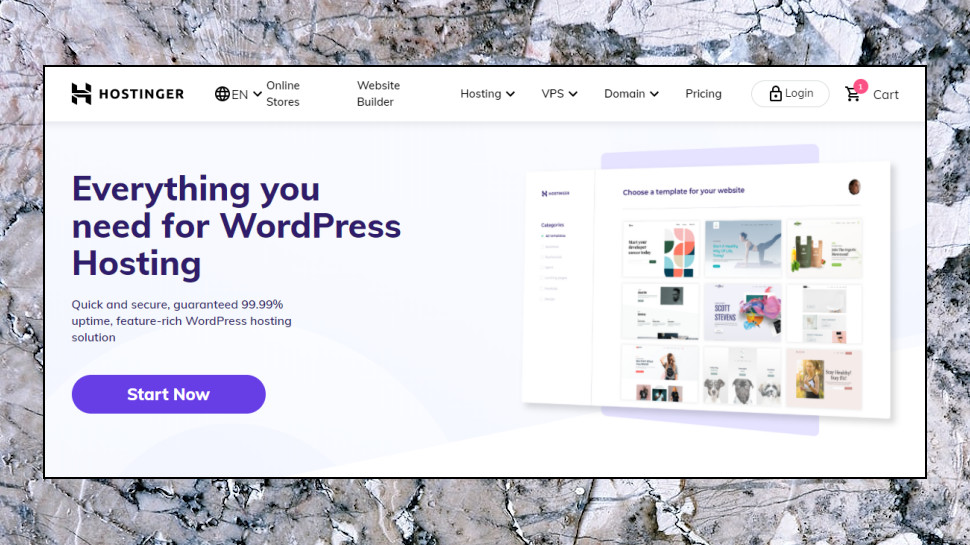
WordPress Hosting
Hostinger's WordPress hosting improves on the shared plans in several important ways. Even the cheapest Starter plan supports 100 websites (within 20GB storage), gives you 100 email accounts, free SSL and domain, LiteSpeed caching and weekly backups, all for a tiny $2.49 over the initial four years ($119.52 total), $3.49 when you renew.
Upgrading gets you more storage space, support for 300 sites, and either Jetpack Personal or Premium. You're still restricted in various ways, though - 100 email accounts, 100 domains and so on - and if you genuinely need to create more than 100 sites, that might be an issue. The higher plans are notably more expensive, too, at an initial $7.45 and $14.95 a month, so it looks to us like the Starter plan is the highlight of the range.
Managed WordPress plans from other providers are often more powerful. IONOS' WordPress Pro includes enables creating and managing multiple WordPress sites from one dashboard, and the service automatically updates WordPress and plugins for you. Advanced features include staging support (make major changes to your WordPress project without affecting the live site), and there's daily cloud backup thrown in.
All this power comes at a price, though. IONOS has very low prices, but even its most basic single-site plan costs $18 billed monthly, around seven times the cost of Hostinger's Starter WordPress plan (though keep in mind that's over four years; opt for monthly billing with Hostinger, too, and you'll pay $11.95.) If you're new to WordPress or working on a small site, start with a simple product, like Hostinger's shared plans. Upgrade to full managed WordPress later, if you feel you need it.

Hostinger business web hosting | 4-years | $4.09 per month
Exclusive to TechRadar readers. This is an incredibly cheap deal. You can get a free domain, 100GB storage, unlimited traffic and a free SSL certificate. This package is perfect if you plan to host just one website and grow it rapidly with plenty of features not usually found at this price level.
View Deal
Servers
More demanding users could try one of Hostinger's semi-managed VPS plans. These start with a basic 1 vCPU, 1GB RAM, 20GB storage and 1TB bandwidth setup for an initial $4.95 a month on the annual plan, rising to $9.05 on renewal. Or a very capable 4 vCore, 4GB RAM, 80GB storage and 4TB bandwidth plan for $23.95 for the first year, $36.35 on renewal.
This is good value, and notably better than we see from most providers. Hostwinds' equivalent 4 vCore 4TB VPS starts at $44.99, for instance, and renews at around $50, significantly more expensive.
But Hostinger hasn't finished yet. It also has a small Windows VPS range, starting with a 4 vCore, 2GB RAM, 50GB storage and 4TB bandwidth plan for $30 a month on the annual plan, $26 over two years (there's no introductory discount, so prices don't increase on renewal.)
If even the most powerful VPS isn't enough for you, we would normally recommend you turn to the dedicated hosting plans. But in this case, bad news: Hostinger doesn't have any.
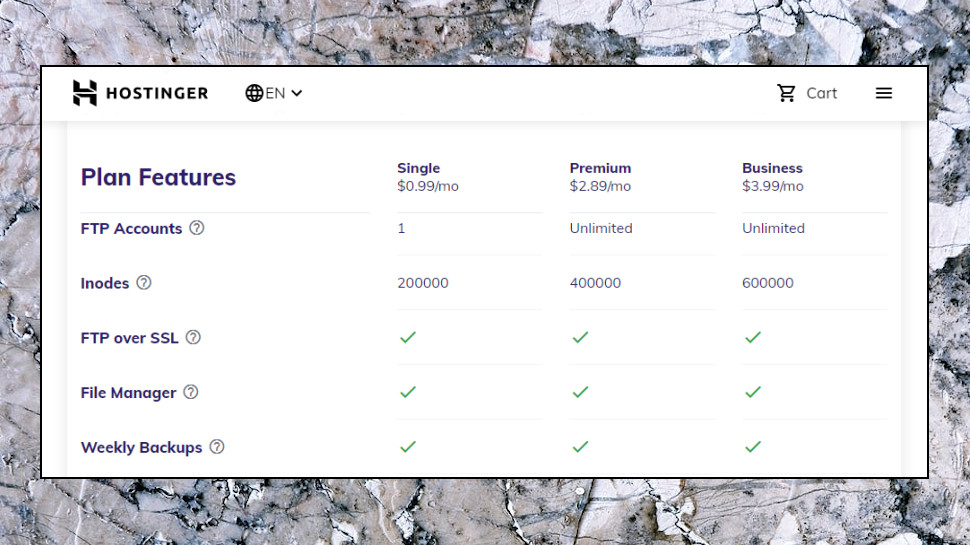
Account setup
While many hosts are annoyingly vague about the low-level details of their packages, Hostinger spells out almost everything in a lengthy comparison table. If you care that the baseline Single Shared Hosting plan only allows one cron job and doesn't support SSH access, for instance, you'll discover that here.
Choose a plan, click Buy and you're presented with various subscription options (usually that's monthly billing along with one, two- and four-year plans).
Mostly these work as you'd expect: the headline price quoted on the site is for the longest term, and you'll pay a little more for shorter subscriptions.
The only significant issue is the monthly plan, which is often so expensive that it's really not worth considering. The annual Single Shared Hosting plan costs a total $35.88, for instance; the monthly plan is $9.99 plus an initial $4.99 setup fee, $14.98 in total, or a total of $34.96 after just three months.
Cloudflare integration is available at a one-off $9.95 for the lifetime of your account. That's a little odd – Cloudflare-supporting hosts generally offer it for free – but it doesn't add a lot to the total, especially if you're signing up for two or four years.
There are plenty of payment options available, including PayPal, credit card and Bitcoin. We chose PayPal and handed over our virtual cash in the usual way. A website link took us to a simple startup wizard and a welcome email quickly arrived with more details.
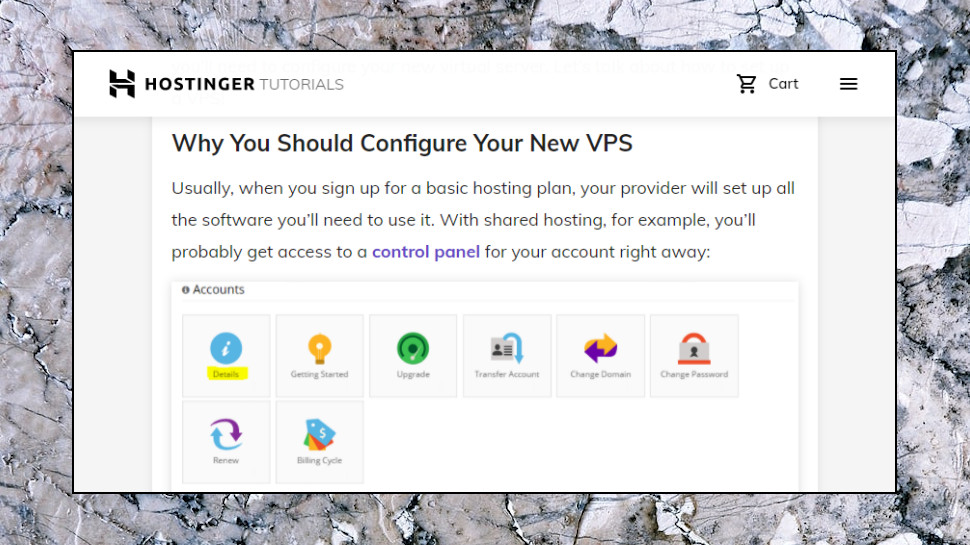
Creating a site
Hostinger's setup wizard opened by asking us whether we wanted to register a new domain, transfer a domain from another company, or use an existing domain but leave it with the current registrar.
You're also able to choose where to host your site, conveniently: North America, the UK or Europe.
We chose the 'existing domain' option and were given Hostinger's four name servers, and told to update our domain DNS settings.
The final 'Start website' step offered five options to help us create our website.
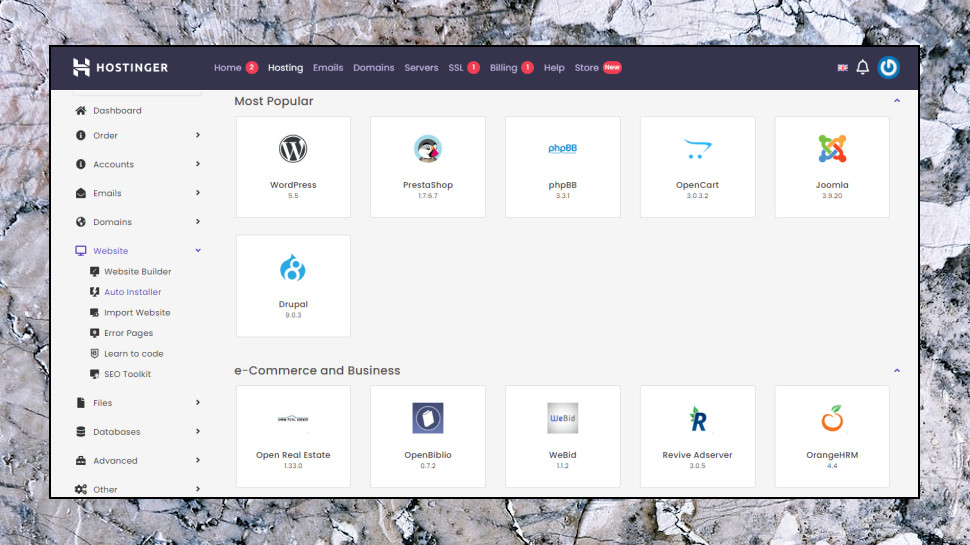
Install WordPress took us to a straightforward WordPress installer. All the default settings were sensibly assigned, and after choosing an admin password we could set the system up with a click.
Auto Installer uses the same automated approach to install more than 100 popular apps, including Joomla, PrestaShop, OpenCart, phpBB and Drupal. We prefer Softaculous, the installer often provided by other hosts, but this one is perfectly adequate and will get your chosen apps installed at speed.
Zyro Builder is Hostinger's website builder. This covers all the basics, with around 200 responsive templates, easy drag-and-drop customizations, and options to embed videos, maps, social media widgets and simple e-commerce features.
It's not for advanced users – there's no blogging platform, for instance – and design is more about mild tweaking of a template than building something new from scratch. But it's capable of creating some quality sites, and there are no annoying restrictions on page numbers or site size to get in your way. (That's very unusual for a free website builder in budget shared hosting.)
File Manager opens a browser-based file manager where you can upload your site. This is most useful for small static sites, but you could also use it to manually install more sophisticated apps, perhaps setting up custom databases and editing configuration files.
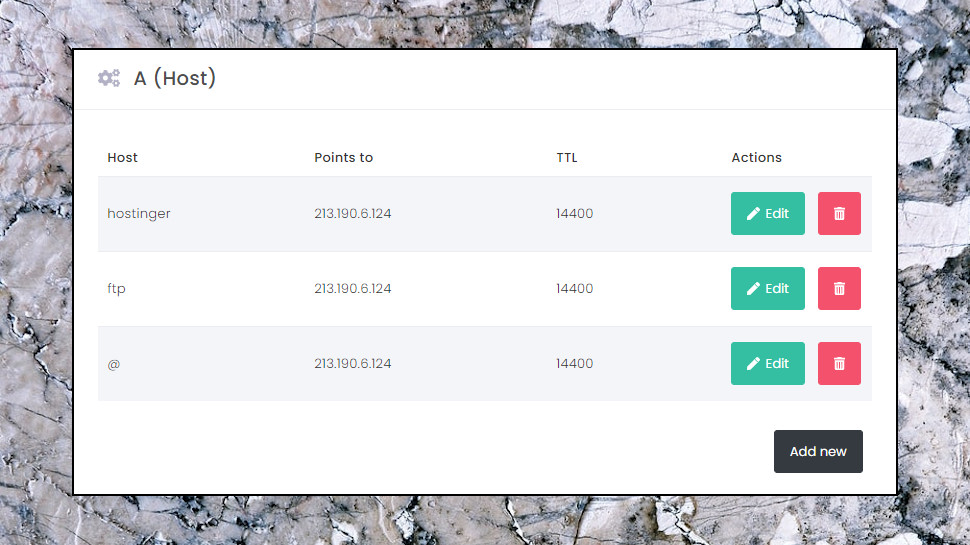
Access Manager is an unusual extra tool which allows you to give others access to your Hostinger account, enabling them to work on creating or managing the site with you. You could do something similar by sharing your credentials with others, but this is much safer. Everyone gets their own login, and the people you invite don't get full access to your account. They're able to create or edit a website page, for instance, but by default they can't buy a new product with your stored payment details, or change account details such as your registered email address.
If you don't want to commit to this right now, you can skip it all and head straight for Hostinger's well-designed cPanel-like site manager, where you'll find tools for organizing domains, subdomains, databases, SSH access, emails, FTP accounts and more. There's a lot of power here, and hosting first-timers might be a little intimidated, but start to explore and it quickly begins to make sense. Even novice users will be finding their way around the key features within a few minutes.
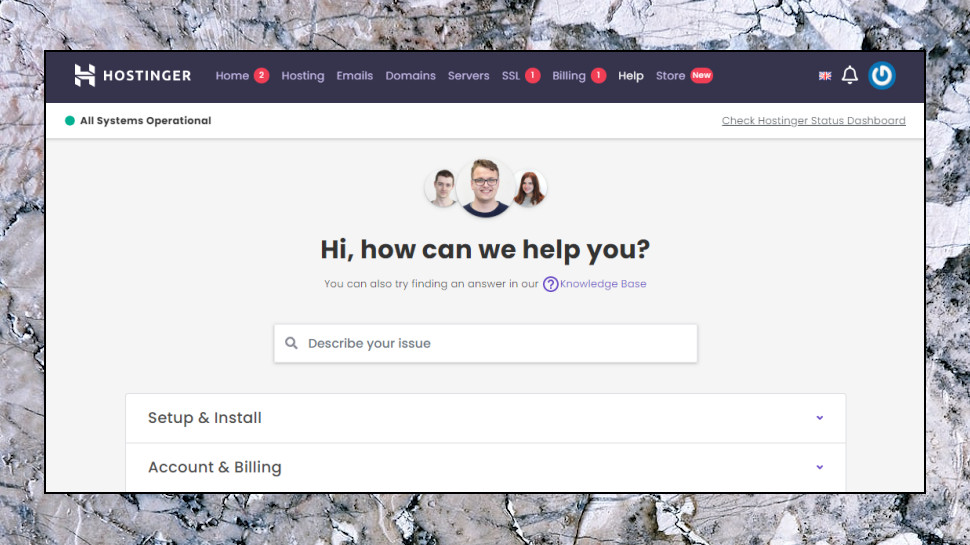
Support
Everyone needs a helping hand sometimes, even experts, so it's important for web hosts to have a good support system.
Clicking 'Help' on Hostinger's Control Panel opens the service knowledgebase. This groups content by well-chosen topics (Setup & Install, Account & Billing, Hosting & Website, Privacy & Security, Domains, Emails) and has a search box to help you find whatever you need.
There's not a lot of content displayed up-front, unfortunately. The various knowledgebase sections have only four or five articles listed, and even these don't always cover the most common topics. (The highlighted Emails articles have nothing to do with creating or managing email accounts, for instance, and mostly cover setting up email accounts on various device platforms.)
Using Search gets you access to more articles, though, and they proved to be more useful. Searching for 'permissions' gave us advice on setting file and folder permissions, as well as referring to specific error messages ('403 forbidden'). Entering 'change PHP version' immediately highlighted the correct cPanel module. The content of these articles is basic, but enough to point users in the right direction.
Hostinger has a big tutorials section with far more detailed articles: 'How to Make a Website – the all-in-one Guide', 'How to Launch a WordPress website', 'How to back up your emails', and more. These seem well-written and genuinely helpful, but, bizarrely, they can't be located from the knowledgebase search box. Hostinger has a lengthy tutorial titled '30 WordPress SEO Tips', for example, but if you type '30 WordPress SEO Tips' in the Search box on the Help page, it won't appear. You must go back to the control panel, click the Tutorials link and search again there.
Even when we reached the tutorials, some very basic searches returned disappointing results. As Hostinger sells Windows VPS hosting you'd expect one or two tutorials on configuring this, right? But when we searched for Windows VPS, the first articles were 'Securing Ubuntu VPS with Linux Firewall' and 'How to List Users on Ubuntu Linux VPS.'
Still, if you can't find what you need, support is available 24/7/365 via live chat and a ticket-based system. We submitted a query via live chat, and a helpful agent began providing a useful reply within a couple of minutes.
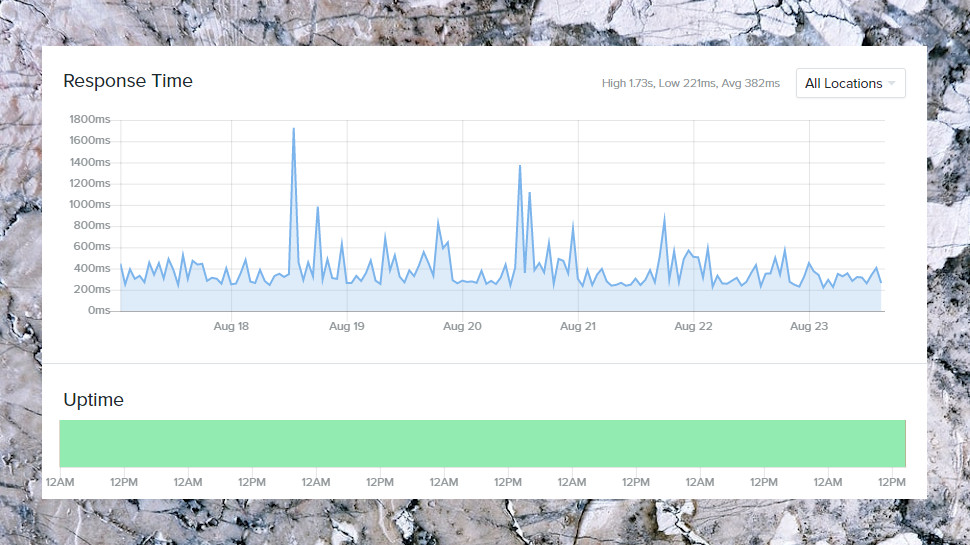
Performance
We rounded off the review by using Uptime.com to monitor our test website from multiple locations around the world, logging response times and any downtime.
Our test site was hosted on Hostinger's most basic shared hosting plan, but still managed a solid 100% uptime record over 10 weeks of monitoring.
Uptime.com recorded a response time range of 171ms to 1.73s, with an average of 382ms, over the last seven days of testing. Starter shared hosting plans typically manage 200-400ms with an average peak of 700-800ms, so Hostinger is clearly on the slow side when it comes to response times.
Page load times matter too, though, so we used Dotcom Tools' Website Speed Test to measure our site performance from 16 locations around the US and Europe. This time the results were much better at 878ms, putting it in the top 25% of providers.
A mixed story, then, but keep in mind these are comparisons based on the cheapest shared hosting plan from each test provider. Some of those plans cost 5x to 10x the $0.99 you could pay with Hostinger, so on balance we think the company did reasonably well.
Final verdict
Hostinger's starter accounts have some significant limits, but they'll still work for some, and otherwise its products offer plenty of features and powerful cPanel-like site management for a very fair price.
- Best overall web hosting services
- Best WordPress hosting providers
- Best cloud hosting providers
- Best Linux web hosting services
- Best e-commerce hosting
- Best dedicated server hosting
- Best small business web hosting
- Best Windows hosting services
- Best managed web hosting
- Best green web hosting
- Best business web hosting
- Best colocation hosting
- Best email hosting providers
- Best VPS hosting providers
- Best web hosting resellers
from TechRadar - All the latest technology news https://ift.tt/3iaQ6Z9
via IFTTT
0 التعليقات: